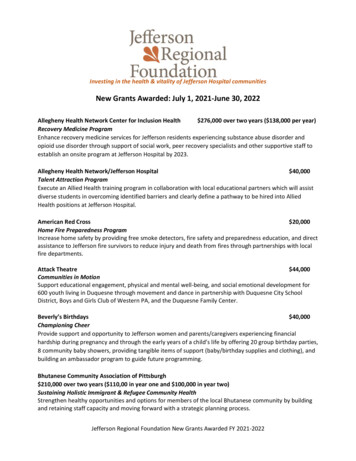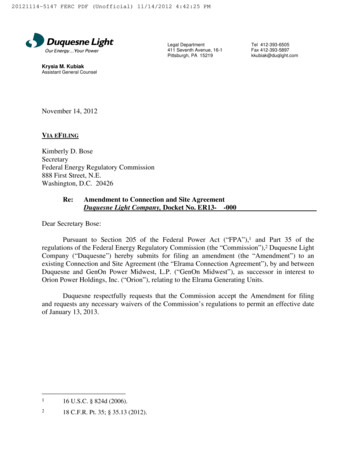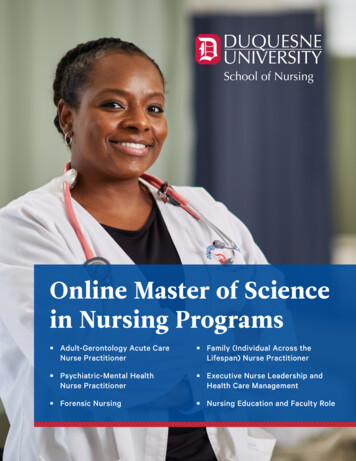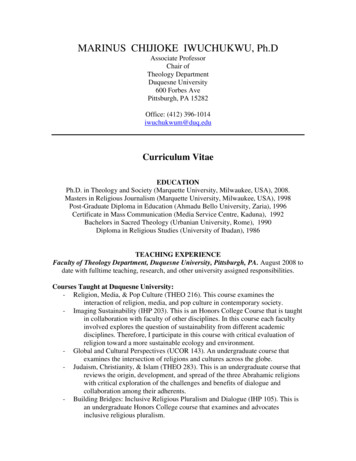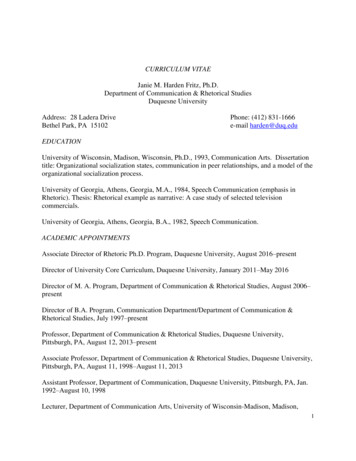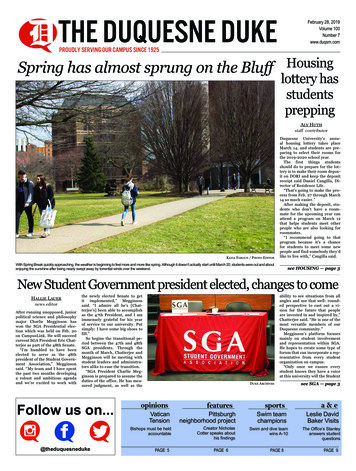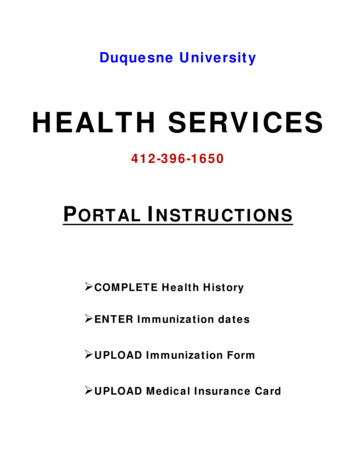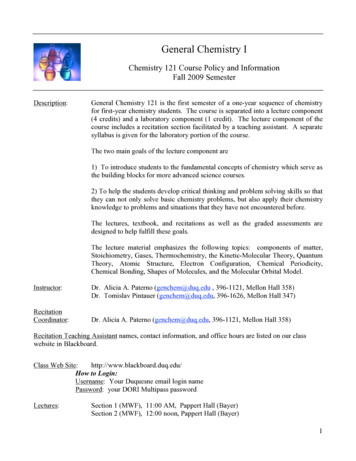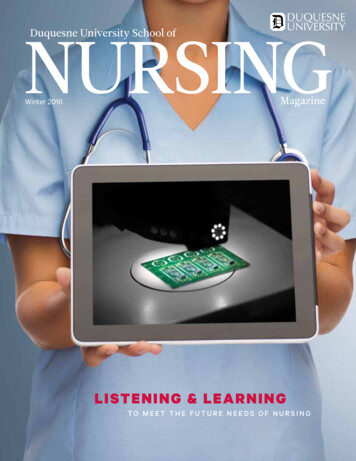
Transcription
D U Q U E S N EU N I VE R S I T YS C H O O LO FN UR SI N GNURSINGDuquesne University School ofWinter 2016MagazineLISTE NING & LEARNINGTO M E E T T H E F U T U R E N E E D S O F N U R S I N G1
2D U QUE SNEUNIV ER S I T YS CHO OLOF N U R S I N GL E T TER FROM T H E DEA NDuquesne University School ofNURSINGWinter 2016MagazineTABLE OF CONTENTS4 M E E TIN G TH E F UTUR ENE E D S O F N UR SIN GWorld-class Faculty and ResearchTransformational ProgramsTechnology Infused Learning14 V E TE R A N S TO B SN P R O G R A M:S U P P O RT I N G MI L I TARYNUR S I N G ST U D E N TS18 EX PA N D IN G R E SE A R C H2 2 FAC ULT Y N E WS24 A LUM N I N E WS2 8 STUD E N T L E A D E R SH IP D E F IN E DDean:Mary Ellen Glasgow, PhD, RN, ANEF, FAANEditor and Assistant Dean, Recruitment:Cherith Simmer, MS, RNDesign:Red House CommunicationsDuquesne University School of Nursing600 Forbes AvenuePittsburgh, PA 15282412.396.6550duq.edu/nursingCover Image: Duquesne University Nursing studentsenrolled in the Biomedical Engineering/BSN dualprogram work closely with circuit boards to developtechnical solutions to clinical problems.The School of Nursing at Duquesne Universityhas been a leader in nursing education andremains at the vanguard. With this inauguralissue of our annual magazine, I am proud toshare some of our accomplishments as well as mythoughts on our future direction.We have nearly 50 percent more students thanwe did just three years ago. Part of that growthcan be attributed to the increased demand for nurses nationwide, but itis also the result of strategic choices we have made to developinnovative academic programs to meet the future needs of nursing.Throughout these pages, you will learn about the new technologieswe offer our students to enrich their classroom and clinical experiences,such as our new Learning and Simulation Center.In recognition of the increasing need for registered nurses withbachelor’s degrees, we launched an RN-BSN program that is completelyonline and also secured federal funding for a program designed toprovide support for veterans who wish to earn nursing degrees.At the graduate level, we pioneered online degree programs, includinga master’s with a concentration in forensic nursing and severalPhD options.And we have introduced the nation’s first undergraduatedual-degree Biomedical Engineering and Bachelor of Science inNursing Program which combines the science and art of patient carewith principles of electrical, chemical and mechanical engineering.With a solid foundation in both the real-life application of health careand the potential for innovative solutions, nurse engineers will have aunique perspective on finding ways to improve the health and qualityof life for patients.We also share the achievements of our faculty, students and alumniwho are making important contributions to the profession as well asto Duquesne’s own reputation for scholarship and service.At Duquesne University, we are honored to play an important role inpreparing nursing students for the profession’s many new opportunitiesand challenges. I am pleased to share this information with you, andwelcome your feedback.Sincerely,Mary Ellen Smith Glasgow, PhD, RN, ANEF, FAANDean and Professor
4D U QUESNEUNIV ER S I T YS CHO OLOF N U R S I N GDUQ UESN ELISTENING AND LEARNINGWE D O N ’ T JUST N EED MO RE N UR SES.WE N EED N UR SES WH O ARE B ETTERPREPARED TO FUN CTIO N AN D EXCELIN CO MPL EX H EALTH CARE SITUATIO N S.M E E T I N GT H EF U T U R EN E E D SO FN U R S I N GFOR NURSES TO THRIVE, NURSING SCHOOLS MUST LISTEN TO THE NEEDS OF A RAPIDLY CHANGINGHEALTH CARE ENVIRONMENT AND PROVIDE INNOVATIVE LEARNING, WORLD-CLASS FACULTY ANDRESEARCH, OPPORTUNITIES FOR EXPERIENCE AND NATIONALLY RANKED PROGRAMS.The leaders of Duquesne University’s Schoolof Nursing have listened and responded.“We recognize the challenges facing the nursingprofession,” says Dean Mary Ellen Glasgow.“We don’t just need more nurses. We need nurseswho are better prepared to functionand excel in complex healthcare situations. To meet theseobligations, we are always seekingways to improve how we areorganized, how we engage withother institutions, how weimplement technology and most ofall, how we prepare our students.”Recognition and a Rise in Rankings Built on nearly80 years of excellence in nursing education, thecumulative results of decades of dedication andforward thinking are measured by rising nationalrankings and endorsements from top scholasticand professional organizations.For the third consecutive time, the School ofNursing was designated as a “Center of Excellencein Nursing Education” by the National Leaguefor Nursing, and has been recognized numeroustimes by various U.S. News & World Reportrankings, such as: No. 75 among all graduatenursing programs—we rose37 places in one year No. 9 among the Top 10Best Online GraduateNursing Programs No. 9 among the Best OnlineGraduate Nursing Programsfor Veterans in the nationAdditional achievements of note include: Advanced 14 places to be ranked in top 20 ofthe Top 50 Most Social Media Friendly NursingSchools of 2014 by Nursing-School.com Named among the Top 20 Online MSN Degrees The online MSN program was also listed at No. 5among the Top 30 online MSN degrees ranked bystudent-faculty ratio.UN I VER SIT YSCHO OLOFNUR SING5
6D U QUESNEUNIV ER S I T YS CHO OLOF N U R S I N GA PROUD PAST, A PURPOSEFUL FUTURE.D U QU ES NE U N I V E R S I T Y ’S S C HO O L O F N UR S INGI S A PI ON EER I N N UR S I N G E D U CAT I O N . First school in Pennsylvania to grant a BSN degree in 1937 Offered the nation’s first online PhD in nursing in 1997DUQ UESN EUN I V ER SIT YSCHO OLOFNUR SING6FACULT Y MEMBERS—an unparalleled number for a nursingschool of our size—have been inductedas fellows of the American Academyof Nursing, a credential that less than1 percent of nurses nationwide can claim. Launched one of the first graduate nursing programswith a concentration in forensic nursing in 2002BUI LDI NG M O M E N TUM WI THWOR LD - CLAS S FACULT Y AND RE SE ARCHToday, the School of Nursing faculty is composed of clinical nursespecialists, registered nurses and nurse practitioners who are guided bya framework that depicts how nurses practice, collaborate, communicateand develop professionally to provide the highest quality care. Faculty members participate in numerous opportunities to focus oncommunity service projects such as the school’s Community-BasedHealth and Wellness Center for Older Adults, which provides wellnessoriented health care services to vulnerable populations in Pittsburgh.The goal is to deliver holistic and culturally competent care thatpromotes health, functioning and quality of life. Nursing faculty are developing areas of expertise essential to theirscholarly achievements and are attracting more grant funding forresearch. Faculty research focuses on the intersection of culture andhealth, and specifically on the topics of improving the health of veterans,older adults, persons with obesity and chronic diseases, and forensics.We understand that our rich history of nursing education serves as a guide andreminder of the great things that can be accomplished with strategic planning andan eye focused toward the future. Experienced dramatic enrollment growth with 48 percent more students thanthree years ago Accepted a higher number of academically accomplished students than ever before Saw an increase in the number and dollar value of grants and funding for research,scholarships and program development7
8 D U QUESNEUNIV ER S I T YS CHO OLOF N U R S I N GDUQ UESN EAS A TRANSFORMATIONAL LEADER IN NURSING EDUCATION,THE S C HO OL IS A LWAYS E X A MINING E VOLU TIONS IN TH E H EALTHCA RE F IE LD A ND ID E NTIF YING A ND D E VE LOP ING ACADEMICP RO G RA MS THAT A D D RE S S C U RRE NT NE E D S IN NU R SIN G WH IL ES U P P ORTING ITS G ROWTH INTO N EW AREAS.UN I V ER SIT YSCHO OLOFNUR SING“The biomedical engineeringprogram at Duquesne,especially when combinedwith a nursing degree, offersstudents an ideal balance ofhealth care and technology.”NerdScholar July, 2014B E T T E R T E AC H I N GW I T H T E C H N O LO GYDigital resources in the School of Nursingare helping students hone their assessmentskills by providing effective ways to monitortheir progress quickly and accurately. ExamSoft, nursing education softwaredesigned to unify both objective andsubjective evaluation measures andintegrate them with learning objectives,is now used in undergraduate classes.It allows online testing to securely collectand integrate performance informationand produces a database to chart learningprogress and the effectiveness ofcoursework design.TR ANS FOR M ATION A L PRO G R A M SBiomedical Engineering to Bachelor of Science in Nursing(BME/BSN) Program The changing health careenvironment is creating opportunities for careerspreviously unseen in the world of nursing. This includesa profession for nurse engineers, which combines thescience and art of patient care with principles ofelectrical, chemical and mechanical engineering.To meet these emerging health care trends, theschool has introduced a groundbreaking five-yearBME/BSN program, the first of its kind in the nation.This interdisciplinary dual-degree produces a synergyof expertise that is unique, timely and essential todeveloping technological solutions to clinical problems.PhD in Nursing Ethics Even the simplest actions in healthcare have ethical dimensions. A new interdisciplinaryPhD in Nursing Ethics, created in collaboration withDuquesne University’s Center for Healthcare Ethics,is taking nursing ethics to new heights.The program is designed to help nurses developequitable patient care perspectives and address moraldistress and other health care problems related toconscience and moral choice.New PhD Options Since launching the nation’s firstcompletely online PhD Nursing program more than20 years ago, the School of Nursing continues to be arecognized leader in graduate nursing education.In concert with current trends in nursing as well asthe Institute of Medicine report and the Robert WoodJohnson Future of Nursing Scholars Program, theSchool of Nursing has recently announced a new3-year and revised 4-year PhD nursing program. Emphasisis placed on the health needs of vulnerable individuals andpopulations within the context of social justice. Both programsinclude a study abroad residency experience in Rome orDublin, which deepens global health care perspectives. Andto accommodate the career and personal demands of nursingprofessionals, the PhD program continues to have full-timeand part-time tracks.Additionally, our new and innovative PhD admissions option,the DNP to PhD Program, is designed for DNP prepared nurseswho want to pursue a PhD in Nursing degree that will enablethem to function as independent researchers. The program is38 credits and can be completed in under three years. To help increase their learning potential,undergraduate students use iPads thatcontain instructional videos and softwareapplications including Skyscape, anapplication that provides a comprehensivenursing reference library and study guides,as well as Project Concert, clinical softwarefor pinpointing problem areas in eachstudent’s learning. All nursing textbooksare issued as digital publications. Students and members of the facultycollaborated to create Dusonburgh,a virtual city with residents who are varieddemographically and in terms of theirhealth, occupations and behaviors.Undergraduate and graduate nursingstudents use Dusonburgh to learncommunity-centered, population-basedhealth and primary care.9
10D UQUESNEUNIV ER S I T YS CHO OLOF N U R S I N GDUQ UESN EUN I VE R SIT YSCHO OLOFNUR SINGTHE BUREAU OF L ABOR STATISTIC SP ROJE CTS THAT THE NU MBE R OFE MP LOYE D NU R S E S WILL G ROW BY 71 2 ,0 00,OR 26 P E RC E NT, BY THE YE A R 2020. A DDRE P LAC E ME NTS F OR C U RRE NT NU R S E S WH ORE TIRE , A ND THE TOTA L NU MBE R OF JOBOP E NING S S WE LLS TO 1. 2 MILLION.G R OW TH TO ME E TT H E F U TU R E N E E DS O F N U R SIN GWith the passage of the Patient Protection andAffordable Care Act in 2010, more than 32 millionAmericans are gaining access to health care services,including those provided by registered nurses andadvanced practice registered nurses.More nurses are needed—and they need to haveadvanced degrees.The School of Nursing is ready to embrace the futurewith continued careful, strategic planning to growin ways that build on our reputation as a pioneer ofnursing education and one of the nation’s foremostnursing schools.“More than any other gauge of success, our biggestchallenge and our greatest achievement remainsour ability to educate students,” Glasgow says.“Students are going to encounter the challengesbrought about by rapid changes in health care andits related technologies. Our goal is to ensure ourstudents exemplify—in the best Duquesne tradition—the highest levels of competency, compassion andethical behavior.”T H A N KS TO O U R D O N O R SThe generosity of two major donorswas critical in equipping the Schoolof Nursing’s new Learning andSimulation Center.Pocket Nurse, a major distributor ofmedical supplies and equipment forhealth care education, has been along-time partner with the School ofNursing, providing high-tech simulatorsand basic and advanced patient careequipment. Most recently, Pocket Nurse provided neonatal and NICU equipmentfor the Learning and Simulation Center.The Weisbrod Foundation made itpossible for the School of Nursing tocreate the Robert and Mary WeisbrodFundamental Skills Lab within theLearning and Simulation Center.The Weisbrod Foundation’s giftprovided funding to acquire the digitalequipment and video recording andplayback technology used in clinicalskills evaluations and debriefing.11
1 2D UQUESNEUNIV ER S I T YS CHO OLOF N U R S I N GDUQ UESN EUN I VE R SIT YSCHO OLOFNUR SINGT EC HNOLO GY IN F USED L EA R N I N GChanges in technology and in the way our students learn is at the heart of ournew clinical skills simulation lab—a space dedicated to creating a deeper style oflearning. It offers enhanced realism, advanced video technology and vitalresources needed to help students grow into competent and confident professionals.Open for the first day of fall 2015 classes, the School of Nursing’s new Learningand Simulation Center is the culmination of years of planning. Occupyingapproximately 7,000 square feet of space, the entire floor of the newly remodeledLibermann Hall is substantially larger than the previous clinical lab and offers anarray of technology that increases realism, improves the quality of evaluation andenhances clinical learning.“Because our new center is“ BECAU S E O UR NE W C E NT E R I S L A R G E R ,larger, more sophisticated andMO R E S O P HI ST I CAT E D A ND M O R Emore realistic, we’re providinglearning opportunities that areR EA L IST I C, WE ’ R E P R OV I D I NG LE A R NI NGusually unavailable in a clinicalO P P O RT UNI T I E S T HAT A R E US UA LLYunit,” says Rosanna Henry, MSN,U N AVA I L A B LE I N A C LI NI CA L UNI T.”RN, director of the Learning andSimulation Center. “That meanswe’re better equipped not only to help students acquire clinical skills but to inspirethem to become fully engaged and committed to learning.”In the new center, state-of-the-art patient simulators and the latest digitalrecording technology are integrated in unique and effective ways. Video recordingand sophisticated playback capabilities in the Robert and Mary WeisbrodFundamental Skills Lab help clinical instructors pinpoint problems and providestudents with performance-based, individualized feedback.Additionally, a conference room in the center is equipped with a Mondopad,a large video monitor, which features intuitive touch-screen controls, interfaceseasily with hand-held computers and mobile phones, and supports remoteviewing from any location that has Internet access.There is also new equipment to help increase realism in nursing simulationsand create meaningful and effective learning experiences. For example, neonataland NICU simulations are now benefitting from the recent acquisition of abirthing bed, neonatal monitor, ventilator, incubator and infant warmer. Thesecostly items are often out of reach for all but the largest nursing schools, but wereprovided to Duquesne University through the generosity of Pocket Nurse, one oftwo important gifts that helped to create the center.In all simulation areas, the oxygen flow meters and wall-mounted suctionequipment work just like their counterparts in real clinical settings. And formaximum realism, audio recordings and special “short throw” video projectorsare used to re-create the visual and auditory qualities of a hospital.From a nearbycontrol room orfrom their offices,instructors cancontrol simulation mannequins that are capableof emitting lung and bowel sounds, or normal andabnormal pulses and heartbeats. Students canapply dressings to a mannequin’s wounds orperform catheterizations, injections and irrigationsas well as practice intubation and defibrillation.These mannequins have the physical characteristicsand the symptoms of maladies corresponding tomale and female patients in every stage of life. Oneof the female mannequins even progresses in thestages of pregnancy and gives birth.Perhaps the most adaptable and realistic ofthe mannequins is SimMan 3G, which can bemanipulated wirelessly to react to correct orincorrect drugs and dosages. With convincingfidelity, SimMan 3G exhibits a range of physiologicresponses, including changes in pupils andeyelid movement; bleeding, secretion of fluids,perspiration and tears; mimicking seizures; andemitting speech and vocal sounds.The entire Learning and Simulation Center has ahighly efficient floor plan that includes the Robertand Mary Weisbrod Fundamental Skills Lab alongwith areas for instruction in acute care, healthassessment, basic care, medication and homecare, as well as two large classrooms. It also hasstandardized patient rooms where outpatient clinicvisits can be simulated. Combined, those areascan easily accommodate eight to 10 clinical groupsof eight students each, along with the clinicalfaculty members who are instructing each group.The center also accommodates flexible scheduling.It has open lab sessions for students who want tolearn on their own time. Clinical faculty membersalways have the options of bringing classes back tothe center and referring individual students to thecenter, if necessary, for remediation.1 3
14D UQUESNEUNIV ER S I T YS CHO OLOF N U R S I N GDUQ UESN EThe vision of the Veterans toBSN Program is to increaseemployment opportunities forveterans and contribute to adiverse professional nursingworkforce that improveshealth care services tocommunities worldwide.VETERANS TO BSN PROGRAM:S UP P O RT I N G M I LI TA RY NUR S ING ST UDENTSA nearly 1 million federal grant has beenawarded to the School of Nursing for an innovativeprogram designed to provide support for veterans,active military and reservists who wish to earnnursing degrees.The Duquesne University School of Nursing isamong a select group of nursing schools in thenation to secure the funding.Known officially as theVeterans to Bachelor ofScience Degree in Nursing(VBSN) Program, the grantis administered through theDepartment of Health andHuman Services’ HealthResources and ServicesAdministration (HRSA)over a three-year period.Duquesne and the School of Nursing have atradition of welcoming veteran students, a crucialfactor for securing the grant, as was having threeseparate pathways for veterans to earn a BSN:a traditional four-year program, an accelerated12-month second degree program, and acompletely online RN-BSN program.According to Mark Crider, PhD, MSN, RN,assistant dean for Administration and SpecialProjects, the author of the grant application anddirector of the VBSN Program, our veteranstudents’ biggest challenge is their reluctance toapproach anyone except other veterans for help.The School of Nursing is working to bringinstructors on board who areveterans in order to enrich thecollective experience of thenursing faculty and furtherenhance the military-friendlyaspect of student life.One such member isPatricia Kelley, PhD, RN,FNP-C, GNP-C, FAANP,who comes with a deepunderstanding of military culture. Kelley,in addition to a lengthy career as a Navy nurseand officer, served in the Office of Research andDevelopment in the Department of VeteransAffairs. She also served on the nursing facultiesof the Uniformed Services University of the HealthSciences and The Catholic University of America,among others.RECO GNIZED AGAIN IN 2016AS A MILITARY FRIENDLY SCHO OLBY VICTO RY MEDIA , TH E SCH O O L O F N UR SIN G ISCO MMEN DED FO R PROVIDIN G L EADIN G PRO GRAMSAN D STUDEN T SUPPO RT FO R VETERAN S AN DMEMB ER S O F TH E ARMED FO RCES.UN I VER SIT YSCHO OLOFNUR SING15
16D UQUESNEUNIV ER S I T YS CHO OLOF N U R S I N GAccording to Crider, the grant program has been thecatalyst for nursing schools to collaborate on creatingand evaluating support initiatives for veteran students.The nursing schools selected for funding, he explained,were chosen over a three-year period so that schoolsthat established the programs earlier gain experiencethat can be passed to the second and third groups ofschools selected.In fact, faculty members from grantee nursingschools communicate regularly to share best practices,and are currently working together to develop testingand other criteria to formulate uniform standardsfor awarding college credit for military experienceand training.Beyond the terms of the grant that helped launchthe VBSN Program, the School of Nursing also plansto expand existing partnerships and developnew clinical connections with hospitals, serviceorganizations and community-based agencies thatprovide care and services to underserved veteransand their families.“The core values of dedication and service thatdefine the military experience are the same valuesthat inspire people to enter the nursing profession,”says Dean Glasgow. “Service to others is also centralto Duquesne’s mission, so in a fundamental way ournursing school is an ideal fit for the VBSN Program.”DUQ UESN ESCHO OLOFNUR SING“The veteran students’experience, as well as myown background andeducation in the area ofleadership development,affords an opportunityfor building the skills of aleader in these students,”Wagner says.D U QU ESNE WELC OM ES M I L I TA RY ST U D ENTSWith a number of veteran-friendly student services, DuquesneUniversity has a long tradition of welcoming students who servedin the armed forces. U.S. News & World Report puts Duquesne at No. 24 in thenation for helping veterans pursue a college education andranks the School of Nursing in the top 10 graduate onlinenursing programs for veterans. Duquesne has been consistently named among just 15percent of post-secondary educational institutions acrossthe nation as a Military Friendly School by Victory Media,a veteran-owned publisher. Currently, Duquesne participates in the Post-9/11 GI Billas well as the Yellow Ribbon Program, a grant-matchingagreement between the U.S. Department of Veterans Affairsand a college or university that can significantly increaseveterans’ educational benefits.Along with those federal grants for educational expenses andin addition to the dedicated veterans recruiter and academiccoach/mentor provided by the School of Nursing, the Universityoffers a range of personalized support services that are availableto every veteran, reservist or member of the military, as well astheir family members: Expert financial aid assistance Duquesne University Student Veteran Association Free psychological counseling services from the DuquesnePsychology Clinic Legal aid through the Duquesne Law School’s Tribone Centerand Veteran’s ClinicDominique Clerkley, Air Force 2014, Nursing Class of 2018UN I VER SIT YV E TE R AN S TO BSN PR O GR AM SUPPO RT:I NT RODUCI NG LEE WAGNER AND ALEX I S WEAVERNew veteran-focused initiatives in the Schoolof Nursing enabled by the VBSN grant include effortsfor recruiting and enrolling veterans as well asensuring that students graduate and enter the ranksof the nursing profession. Initiatives include twonew positions that are pivotalin helping veterans make thetransition to nursing students.Alexis Weaver, who cappedher Navy career as a recruiter,now serves the School ofNursing by focusing solely onrecruiting veteran prospects.Having dedicated ex-militaryAlexis Weaver, Veterans to BSNNursing Recruiterpersonnel assist veteranstudent prospects in the recruitment and applicationprocesses as well as during their semesters as nursingstudents is a way of extending the camaraderie ofthe military to the students’ academic experience.Her own military career, Weaver explains, helps toprovide insight into the motivations and concerns ofex-military students, and is the common ground thatcan nurture trust.“Veterans just need someone to connect with whothey feel comfortable talking to and want to workwith,” Weaver says. “I will be their first contact andwill remain a constant presence after they are inthe program.”Lee Wagner, a former Marine sergeant withleadership development experience in corporatebanking, is the new academic coach dedicated toassisting veteran nursingstudents. His role, Wagnerpoints out, is not to replacefaculty or academic advisorsbut to provide an additionalresource for military nursingstudents and ensure that theyobtain any form of assistance—on or off campus—necessaryLee Wagner, Veterans to BSNAcademic Coachfor success.Wagner does not want veterans to be treateddifferently by staff or faculty, yet he does anticipatehigh levels of academic and professional achievementfrom this group of students. He believes their militaryservice makes them likely leaders. “The veteranstudents’ experience, as well as my own backgroundand education in the area of leadership development,affords an opportunity for building the skills of aleader in these students,” Wagner says. “I aim to helpthem make the most of the transferrable skills thatthey acquired from their time in the service.”17
18D UQUESNEUNIV ER S I T YS CHO OLOF N U R S I N GDUQ UESN EL AB RESEARCH HELPS PEOPLEAD OPT NEW ATTITUDES AND NEWWAYS OF LIVING BEFORE AND AFTERBARIATRIC SURGERY.UN I VE R SIT YSCHO OLOFNUR SINGDuquesne Universityis one of three centersnationwide to collectdata for a landmarkresearch projectfunded by the NationalInstitutes of Health.EXPANDING RESEARCHLet’s call her Mary. She was healthy and active—not at all overweight. But around age 40, all of thatchanged. Mary became seriously ill, bedriddenand unable to meet the long hours and physicaldemands of the business she owned. Forced toshutter her once-successful company, Mary grewdespondent and began puttingon weight.Despite diet and exercise—and after decades languishing ina state of worry and frustrationbrought on by steady weightgain and attendant medicalcomplications—Mary, a personwho had never before had anoperation of any kind, opted forbariatric surgery at age 62. It was a last ditchattempt to overcome the threats to her life andhealth from obesity. The procedure led to adramatic weight loss, a reduction she has beenable to sustain for more than five years.Currently, Mary and other patients like her arecritical pieces of a puzzle that researchers in theSchool of Nursing and elsewhere are hoping tosolve in order to decrease the risks and maximizethe benefits of bariatric surgery.The research project, funded by the NationalInstitutes of Health (NIH), is part of the LongitudinalAssessment of Bariatric Surgery(LABS) research consortium.Duquesne University is one ofthree centers collecting data forit nationwide.The project is hoping to bringto light the changes in mentalhealth and eating that occurpost-surgery and understandhow they may be related toweight loss, explains Associate Professor MelissaKalarchian, PhD.Research that helps Mary and others like heradopt new attitudes and new ways of living beforeand after bariatric surgery has for years been aspecial focus of Kalarchian’s career.19
2 0 D UQUESNEUNI V ER S I T YS CHO OLOF N U R S I N GAs a researcher, Kalarchianhas secured millions in grantfunding, the majority fromNIH. And in only two yearsat Duquesne, her abilityto develop collaborativeopportunities and securegrants is making a significantdifference for the School ofNursing’s research program,with the number of proposals submitted at anall-time high. In addition, her nationally recognizedexpertise has helped to secure her appointment asa standing grant review panelist for NIH and thePatient-Centered Outcomes Research Institute.In her relatively short time at Duquesne, Kalarchian’svision and expertise have made it possible for theSchool of Nursing to create a top quality researchprogram, one that increases faculty engagement andstudent participation in nursing research.Kalarchian points out that her research history andchosen methods also dovetail nicely with the nursingprofession. “The research I’m drawn to, recognized forand good at is at the nexus of research and practice,”she says. “Nurses are right there, too, engaged inevidence-based practice.”An interdisciplinary approach distinguishes manyof the latest research projects in the School of Nursing,including Kalarchian’s own work. Forming researchalliances with colleagues in psychology, public health,statistics, pharmacy, medicine and other fields holdsMelissa Kalarchian, PhDAssociate Dean for ResearchDirector, Center for Research forUnderserved and Vulnerable PopulationsDUQ UESN Ethe promise that upcoming research projects inthe School of Nursing can harness the potential ofcollaboration to better solve complex problems inhealth and health care, Kalarchian explained.“What drew me to Duquesne was not the possibilityof continuing my own work,” she says, “but theprospect of working with faculty and students onac
completely online PhD Nursing program more than 20 years ago, the School of Nursing continues to be a recognized leader in graduate nursing education. In concert with current trends in nursing as well as the Institute of Medicine report and the Robert Wood Johnson Future of Nursing Scholars Program, the School of Nursing has recently announced .

